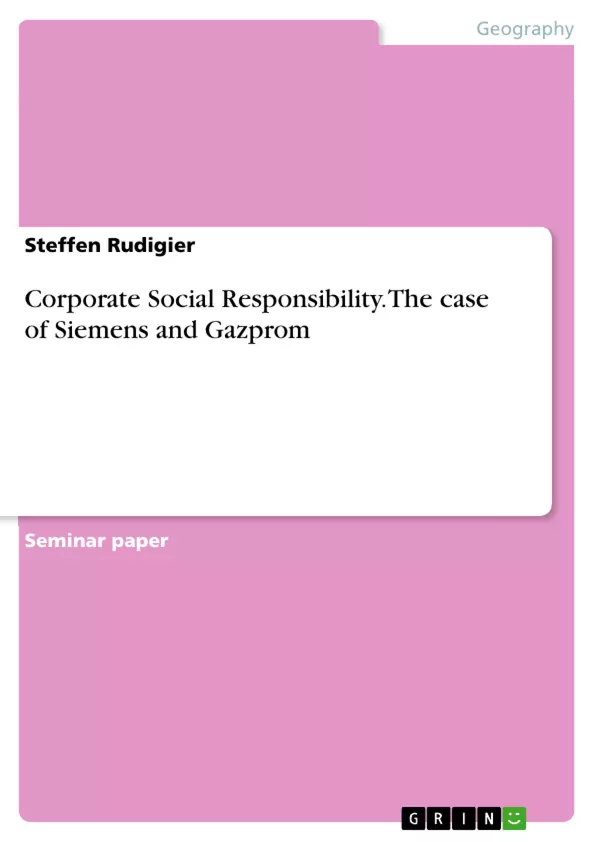Issues like climate change, human rights abuses and poverty dominate our media. Often blamed for responsibility for many of the world’s urgent problems, companies are increasingly expected to address them. The term “Corporate Social Responsibility” has therefore become synonymous for initiatives towards sustainable development. This report was established to examine how far corporate social responsibility and sustainable development of multinational corporations has been practiced in recent years, specifically the German Siemens Group and Russia’s Gazprom which are the subjects of this investigation. The paper first highlights some key issues of the stakeholder theory and stakeholder salience model, which is then applied to determine the companies’ key stakeholders. The most important ones are analysed and compared in terms of power, legitimacy and urgency. Section two deals with the evaluation of the companies’ responsible business approaches, pointing out the extent to which these have increased or decreased and the underlying reasons effecting change. The final section seeks to identify the substance of the described approaches by applying the Ponte et.al typology and finally analysing them using the two contrasting perspectives “Good for Business” and “Critical Development”. Findings in section one show that classifying and addressing stakeholders is fundamentally through managerial perception and the variable constitutional contexts in which the companies are enacted. The results also reveal that Siemens has to deal cautiously with a wider group of stakeholders than Gazprom, due to the different constitutional situations in Germany and Russia. Gazprom is most influenced by its main-stakeholder, the Russian Federation, whereas the power of other stakeholder groups is relatively low. The investigation of Siemens’s socially responsible business approaches in section two revealed that the increasing awareness of CSR in Germany and Siemens’s corruption affair were the main drivers intensifying their recent business approaches. CSR in Russia is still immature; consequently Gazprom’s initiatives are limited. However, CSR is expected to increase in Russia and Gazprom as a global player must pursue international standards.
Inhaltsverzeichnis (Table of Contents)
- Executive Summary
- Introduction
- Stakeholder Salience
- The Stakeholder Salience Model
- Stakeholder Salience Model Siemens/Gazprom
- Responsible Business Initiatives
- Responsible Business Initiatives of Siemens
- Responsible Business Initiatives of Gazprom
- Analysis and Classification of Business Approaches
- "CSR is Good for Business" Perspective
- "Critical Development" Perspective
- Conclusion
Zielsetzung und Themenschwerpunkte (Objectives and Key Themes)
This report explores the practice of corporate social responsibility (CSR) and sustainable development in multinational corporations, specifically examining the German Siemens Group and Russia's Gazprom. It analyzes the stakeholder salience model as applied to these companies, evaluates their responsible business approaches, and classifies these approaches using the Ponte et. al typology and contrasting perspectives of "Good for Business" and "Critical Development".
- Stakeholder Salience and its application to Siemens and Gazprom.
- Evaluation of the companies' responsible business initiatives and their impact on sustainable development.
- Analysis of CSR approaches through the lens of "Good for Business" and "Critical Development" perspectives.
- Examination of the factors influencing the implementation of CSR in Germany and Russia.
- Discussion of the challenges and future prospects of CSR in a globalized context.
Zusammenfassung der Kapitel (Chapter Summaries)
- Introduction: This chapter introduces the concept of Corporate Social Responsibility (CSR) and its growing importance in the global business environment, citing its relationship with issues like climate change, human rights, and poverty. The chapter highlights the evolution of CSR from mere benevolence to a strategic approach involving long-term commitments to social issues aligned with business goals.
- Stakeholder Salience: This chapter explores the stakeholder salience theory and model, using Siemens and Gazprom as case studies to illustrate how stakeholder influence varies across different contexts. It highlights the differences in stakeholder salience for Siemens and Gazprom due to their operational environments in Germany and Russia, respectively.
- Responsible Business Initiatives: This section delves into the responsible business approaches adopted by Siemens and Gazprom, examining the drivers behind their CSR initiatives. It notes the impact of factors such as increasing awareness of CSR in Germany and Siemens' corruption scandals on their CSR strategies, while highlighting the relatively nascent stage of CSR in Russia and its limitations in Gazprom's operations.
Schlüsselwörter (Keywords)
This report focuses on the key concepts of Corporate Social Responsibility (CSR), sustainable development, stakeholder salience, responsible business initiatives, stakeholder theory, Siemens, Gazprom, Germany, Russia, "Good for Business", and "Critical Development". It examines the intersection of these themes within the contexts of multinational corporations and their operations in different national environments.
Frequently Asked Questions
How does CSR differ between Siemens and Gazprom?
Siemens operates in a context with high CSR awareness and must address a wide group of stakeholders, whereas Gazprom is primarily influenced by the Russian Federation as its main stakeholder.
What were the main drivers for Siemens' intensified CSR efforts?
The main drivers were the increasing public awareness of sustainability in Germany and the need to restore reputation following major corruption scandals.
What is the state of Corporate Social Responsibility in Russia?
CSR in Russia is described as relatively immature compared to Western standards, with initiatives often limited by the specific political and constitutional environment.
What is the "Stakeholder Salience Model"?
It is a model used to determine the importance of various stakeholders based on their power, legitimacy, and the urgency of their claims.
What are the "Good for Business" vs. "Critical Development" perspectives?
The "Good for Business" view sees CSR as a strategic tool for profit, while the "Critical Development" perspective analyzes whether CSR truly benefits society or just serves as a corporate facade.
- Quote paper
- MBA Steffen Rudigier (Author), 2010, Corporate Social Responsibility. The case of Siemens and Gazprom, Munich, GRIN Verlag, https://www.grin.com/document/154133



